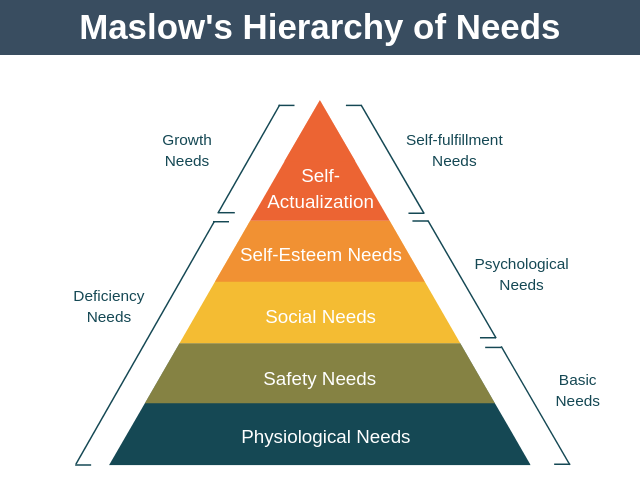
We’re looking at this Sunday’s Gospel (Lk 14:25-33) – and Jesus’ crystal-clear pronouncement of what it takes to be a disciple:
“If anyone comes to me without hating his father and mother, wife and children, brothers and sisters, and even his own life, he cannot be my disciple.”
“Whoever does not carry his own cross and come after me cannot be my disciple.”
“In the same way, anyone of you who does not renounce all his possessions cannot be my disciple.”
That can sound dour – but it’s actually full of hope. Jesus knows us better than we know ourselves – and these requirements are a gift to us. They are a roadmap for human fulfillment.
And that becomes particularly clear when we compare them to modern psychology.
First, we see three different realms represented here: renounce possessions, “hate” others, denial of self.
There’s an interesting parallel to Abraham Maslow’s hierarchy of needs. You can probably picture his pyramid, working from base toward the top:
- Physical needs (food, shelter, reproduction…)
- Security needs (employment, security of home and family…)
- Social needs (belonging, friendship, family…)
- Self-esteem needs (respect of others, achievement…)
And there’s a fifth element at the top of his pyramid – “self-actualization” (sometimes termed transcendence).
It turns out that Prof. Maslow is a curious figure – an atheist, but with firm belief in the existence and necessity of mystical experiences. He proposed a “4th dimension of psychology” that he termed “transpersonal psychology.” He was also a significant figure of the cultural revolution and contributor to the Frankfurt school of thought (the intellectual movement to legitimize Marxism and crush Western Judeo-Christian culture). Maslow’s theories of melding feminine and masculine into only “human” also helped usher in our transgender confusion.
Back to Maslow’s hierarchy – it certainly has a commonsense appeal, though it is very selfy – all ego and id. Here are two more observations that lead to deeper spiritual truths:
- Each level has a shadow side. Physical needs, especially in our culture, morph into the desire for ease and comfort. The societal needs give way to envy and pride (underlying all). And the self-esteem needs lead to vanity.
- Maslow proposed the hierarchy of needs as something we progress through. We can’t get to loving relationships until we satisfy basic physical needs. We can’t get to self-esteem until we have love from others and so on. And only once we “work our way” to the tippy top do we get transcendence.
Maslow viewed the hierarchy as a “motivational model.” Which is to say, as driving forces, and we are, by and large, at their mercy. Our role is really just to advance through them as quickly as we are able. But questions like “why?” and “how?” of climbing the pyramid are mostly up for grabs.
Jesus gives us the key to it all in this Sunday’s Gospel reading. He invites us to go much deeper than Maslow. Jesus invites us to find transcendence in every step of the hierarchy.
Whereas Maslow – in his materialistic and atheistic view of the world – sees “transcendence” as something that only happens at the end, Jesus want’s us to find Him in everything.
Renounce your possession – “find your comfort and security in Me” – and trust that I will provide what you need.
“Hate” others – “satisfy your social needs in Me.” First, St. Augustine clarifies that Jesus is teaching us that we can’t place any relationship in life ahead of our relationship with God. We satisfy our need for social relationships first in Christ and the Trinity, and through them all our other relationships will flourish.
Deny yourself – “so that you find your self-esteem in Me.” We certainly shouldn’t be looking to others as the source of our esteem – we are made in God’s image and likeness. Christ became man and died for us, and desire friendship with us. That is the source of our self-esteem.
What Maslow considered a hierarchy of needs, Jesus turns into a model of discipleship – the only thing we need.
Blessings on your journey with Christ –
Steve and Karen Smith
Interior Life
Postscript: Lk 14:25-33
Great crowds were traveling with Jesus, and he turned and addressed them, “If anyone comes to me without hating his father and mother, wife and children, brothers and sisters, and even his own life, he cannot be my disciple.
Whoever does not carry his own cross and come after me cannot be my disciple.
Which of you wishing to construct a tower does not first sit down and calculate the cost to see if there is enough for its completion? Otherwise, after laying the foundation and finding himself unable to finish the work the onlookers should laugh at him and say, ‘This one began to build but did not have the resources to finish.’
Or what king marching into battle would not first sit down and decide whether with ten thousand troops he can successfully oppose another king advancing upon him with twenty thousand troops? But if not, while he is still far away, he will send a delegation to ask for peace terms.
In the same way, anyone of you who does not renounce all his possessions cannot be my disciple.”
